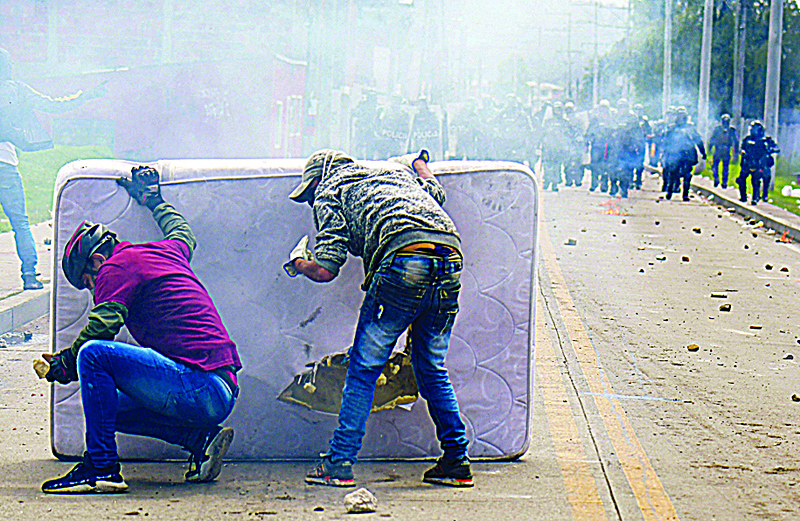 FACATATIVA: Demonstrators take cover behind a mattress during clashes with riot police which erupted during a protest against the government of Colombian President Ivan Duque, in Facatativa, Colombia. - AFP
FACATATIVA: Demonstrators take cover behind a mattress during clashes with riot police which erupted during a protest against the government of Colombian President Ivan Duque, in Facatativa, Colombia. - AFPCALI: Inhabitants of Colombia's third largest city reacted with fear and suspicion to the sight of soldiers patrolling the streets of Cali, but others have been cheering them. Cali has been the epicenter of civil unrest since protests sprang up around the country on April 28, initially against a tax hike that would have mostly affected the middle classes, amid economic pain caused by the pandemic.
According to the NGO Indepaz, at least 44 of 71 deaths recorded during the month-old protests were in Cali, where the mayor's office said there have been 550 people injured. Last Friday, before night fell, Cali's 2.2 million inhabitants-accustomed to the trauma of violent drug cartels operating in their city-faced a new nightmare scenario. Civilians wearing bullet-proof vests and carrying weapons fired at protesters as the police watched.
That day Colombia was marking one month of protests, and 13 people in the city were killed. According to authorities, eight of those had been shot. President Ivan Duque announced that same day he would deploy the military in Cali to help police, who were widely criticized internationally for the repression of demonstrators. During a tour of the city, an AFP team found rubble, piles of rubbish, destroyed road signs, broken windows and even a bullet casing.
Since then, soldiers have been deployed to protect government buildings and shops, many of which had already been looted. As they pass, drivers honk their horns in support of the troops. "Unfortunately the army didn't arrive in time. They totally vandalized the Torre Empresarial building, and many businesses that lost everything," said Angela Sguerra, a 42-year-old doctor from the exclusive Ciudad Jardin neighborhood. But she added that the soldiers "make us feel more protected."
'Get out!'
The mood is different in the working class Siloe neighborhood, which has been through some bloody days since the protests began. "So far we've had no problems," Juliana Bonilla, 28, told AFP. Siloe is one of several parts of the city where protesters are nervously waiting for the arrival of the soldiers. "There have been clashes and friction with police so we're more cautious than ever," said Bonilla. Siloe also shows the signs of violence, including a torched shop from which firefighters pulled the charred remains of a man.
Elizabeth Serna, 40, says the government "militarized" the city without listening to young people left destitute by the coronavirus pandemic and weary of the lockdowns. They are the ones who have taken to the streets to demand solidarity from the government, as well as job and educational opportunities. Duque visited the city on Saturday and while he was applauded in some parts, others shouted: "Get out!"
One youngster yelled in his face: "You're killing us. We don't forgive you." Despite the deployment of troops, neither they nor police have approached the road blocks set up around the city by some protesters. One such demonstrator stands guard on top of a communal bin, surveying with binoculars who was entering or leaving the neighborhood. Nearby a man comes out of a tent and fires a gun in the air.
Julian Rojas, 23, with his face painted in the colors of Colombia's flag, ties himself to an electricity pole and says he's beginning a hunger strike to support demonstrators. "We haven't had a military presence" in the streets, he says, but adds that he's seen helicopters and planes circling over the barricades. Businesswoman Lilibeth Tejada, 41, says she's happy the military has arrived. She wants them to reestablish order so she won't have to "defend my business when they come to loot it." - AFP










